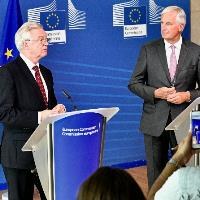(BRUSSELS) – The European Commission’s chief negotiator Michel Barnier told the United Kingdom Monday that it needed to start “negotiating seriously” if progress was to be made on British withdrawal from the EU.
M Barnier was welcoming Britain’s minister for exiting the European Union David Davis to Brussels for a third round of Article 50 talks.
The EU Commission has been increasingly unhappy at the slow speed of the talks and what it sees at a lack of seriousness on the part of Britain in its approach.
Despite the UK government’s recent publication of a number of papers covering issues related to the UK’s plans for withdrawal, M Barnier reflected the EU executive’s increasing irritation at what it sees as Britain’s lack of clarity.
“We need UK papers that are clear in order to have constructive negotiations,” said M Barnier at the opening of this week’s talks: “And the sooner we remove the ambiguity, the sooner we will be in a position to discuss the future relationship and a transitional period.”
No such ambiguity existed on the part of the European Council, he said, whose guidelines are clear on “what is expected on separation, on transition and on conditions for a future relationship.”
He said the 27 Member States of the EU and the European Parliament stand united, and “will not accept that separation issues are not addressed properly.”
The talks come at a time when Britain’s position appears to be shifting and showing growing signs of doubt, with the opposition Labour Party announcing a clear move towards being the party of ‘soft Brexit’, giving its backing to a transition period after Brexit including membership of the single market and the customs union.
M Barnier said the Commission was ready to intensify negotiations over coming weeks in order to make progress.
Mr Davis insisted the latest UK government papers were the product of “hard work and detailed thinking”, and looked forward to “a constructive week of talks between the European Commission and the United Kingdom.”


